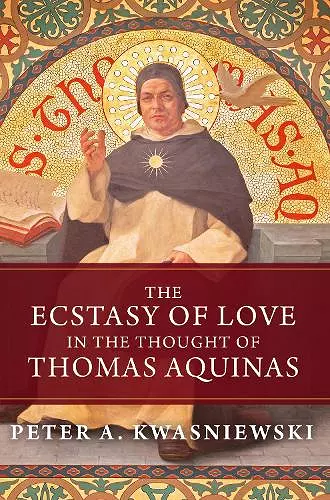The Ecstasy of Love in the Thought of Thomas Aquinas
Format:Hardback
Publisher:Emmaus Academic
Published:30th May '21
Currently unavailable, our supplier has not provided us a restock date

Those interested in the concept of ecstasy would be forgiven for assuming that a sober scholastic like St. Thomas Aquinas had little place for the idea. Yet in this groundbreaking study, sure to refine our understanding of the Angelic Doctor, Peter Kwasniewski shows that St. Thomas contemplates the nature of ecstasy at key stages in the development of his thought and that it plays a crucial role in his doctrine of love.
After a stimulating study of treatments of ecstasy in ancient philosophy, Sacred Scripture, and the medieval tradition prior to Aquinas, Kwasniewski finds that he can be seen as breathing new life into the concept. While his contemporary, St. Bonaventure, for example, tended to restrict ecstasy to the soul's union with God, St. Thomas admitted the place of ecstasy in a variety of human activities.
Furthermore, St. Thomas recognized that all love involves ecstatic transcendence, whether it be the creature's self-oblation to the Creator, the reverence of an inferior for a superior, a superior's generosity toward an inferior, or the mutual affection and help of equals joined in friendship. Love of persons for their own sake generates an ecstatic love in which the self is borne as a gift to another subject by sharing a common life aspiring to common goods. Kwasniewski also examines Aquinas on the question of whether or not God experiences ecstasy, and if so, in what ways.
The Ecstasy of Love in the Thought of Thomas Aquinas makes a significant contribution to our understanding of the doctrine of love and to the interpretation of the thought of St. Thomas Aquinas. It is more than an analysis of key texts; it is an illuminating guide to the grammar of ecstasy.
Studies of medieval theories of love have too often neglected or denigrated the ecstatic elements of love's desire. This book offers an important corrective. It is quite simply the best extended treatment of Thomas Aquinas's understanding of ecstasy." - Michael Sherwin, O.P. University of Fribourg
"Dr. Kwasniewski has given us a very thorough, detailed analysis of the concept of ecstasy, primarily in the writings of St. Thomas Aquinas, but also in the spiritual, theological and philosophical tradition upon which he was drawing. The book is chock-full of texts from St. Thomas's corpus, all meticulously translated by Dr. Kwasniewski, as well as useful texts from and references to other authors contemporary, medieval, and ancient." - Kevin L. Flannery, S.J. The Pontifical Gregorian University Creighton University
"St. Thomas Aquinas's doctrine of love has been carefully examined by several scholars over the past century, but a crucial aspect of the doctrine has generally been neglected, namely, its account of the effect of love that St. Thomas calls extasis, a Latin term modeled on a Greek word that connotes 'standing outside oneself.' Love, in St. Thomas's view, causes one who loves to be carried 'outside himself' towards, and into the presence of, his beloved. The present work rectifies the neglect of extasis by undertaking a thorough examination of the theme in Aquinas's writings, and in so doing, it reveals the surprising importance of extasis as a key to understanding the Thomistic doctrine of love." - Kevin White The Catholic University of America
"Kwasniewski's study opens a seam in Thomas's thought that has been neglected, if not wholly forgotten. It is not only a contribution to appreciating the prayerful and mystical aspects in Aquinas but offers a hugely important avenue into his ethics and anthropology. In detail, and with careful scholarship, the author shows that interior to Thomas's logic, distinctions, and disputations is a lustrous warmth, the cosmos lovingly responsive to divine care." - Graham McAleer Loyola University Maryland
"Peter Kwasniewski's book on ecstasy in Aquinas is one of those rare, profound, scholarly works—like those by Jean Leclercq or Etienne Gilson—which is also written so beautifully, with so much love and clarity, and with so much wisdom, that you could take it to the chapel with you. I think it is exactly the sort of intellectual labor the medieval Dominicans had in mind when they said, 'First the bow is bent in study.' If you want to avoid flaccid prayer, feed the mind. If you want to love God, labor to learn about him and his works." - Jason M. Baxter Wyoming Catholic College
ISBN: 9781645851042
Dimensions: unknown
Weight: 711g
432 pages